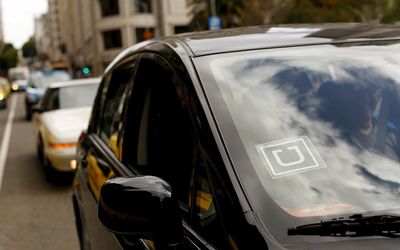A TIME magazine cover story last year spoke of the "sharing economy" that is disrupting industries and transforming the way we live as the likes of Uber and Airbnb drive new approaches to transport and accommodation.
Uber has certainly shaken up SA’s metered taxi industry in a major way, bringing fierce competition to a service that was overpriced and often unreliable.
Affluent and middle-class South Africans who were happy to hail taxis overseas, but had never used taxis in SA were suddenly "ubering".
The advent of Uber has done a fair bit to reduce drunk driving among the middle classes, with folk of all ages increasingly using the service to and from parties and drinking holes, whereas previously they might, hazardously, have driven themselves.
Uber is being used in SA for everything from doing the school run to providing some freedom for elderly folk who can no longer drive.
It has been a transformative technology in the South African context in which the mass market had long relied on unmetered minibus taxis — but the metered ones were not that much more desirable.
Naturally, the metered-taxi industry has put up a fight in SA, as it has done in many other countries, claiming that Uber drivers have an unfair advantage because of the lack of regulation.
Arguably, Uber’s advantage has been in its innovative app and the technology behind it, along with the strict controls Uber imposes on its drivers — and indeed on customers, who are rated by the drivers, just as they rate those drivers.
But the government has been persuaded by the older, metered-taxi industry and has responded with what is in effect a move backwards from the innovations of the "sharing economy".
The Cabinet last week approved the National Land Transport Amendment Bill, which regards Uber operators as metered-taxi operators.
Uber had been negotiating with the government and transport regulators for two years in an effort to get regulations adopted that would cater for new technologies. It had asked the government to include in the bill a category for "transport network operator". It was rejected.
To its credit, Uber has welcomed the bill, expressing its respect for the "key role the national government plays in ensuring that South Africans have access to safe, affordable and efficient transportation options".
This is a smart move. The folk at Uber will no doubt find an innovative way to include meters in their cars, even though the internet and satellite navigation systems that have replaced meters are a lot more efficient. They will have to submit to an additional regulatory burden though, and we trust this will not roll back the gains, in terms of cost, quality, and efficiency, that Uber has brought to SA.
The metered-taxi industry certainly needed the competition. And this is not necessarily a zero-sum game. Chances are that the industry as a whole stands to gain if taxis become more affordable and reliable, prompting more customers to access them.
Evidence from New York a couple of years ago was that the advent of Uber’s service coincided with a significant increase in the total number of rides in New York. The benefits enjoyed by Uber and its customers, in other words, did not come entirely at the expense of New York’s famed (and heavily regulated) yellow cabs. SA’s transport regulators would do well to keep that in mind.
If more of us catch the taxi habit, it can only be good for reducing congestion on the roads and increasing safety. Cutting down SA’s horrid drunk-driving statistics would be a definite plus.
That requires an efficient, high-quality taxi industry that is open to innovation. And that, in turn, requires a regulatory approach that keeps up with the times.

The Uber logo is seen on a vehicle near Union Square in San Francisco, California. Picture: REUTERS/ROBERT GALBRAITH
A TIME magazine cover story last year spoke of the "sharing economy" that is disrupting industries and transforming the way we live as the likes of Uber and Airbnb drive new approaches to transport and accommodation.
Uber has certainly shaken up SA’s metered taxi industry in a major way, bringing fierce competition to a service that was overpriced and often unreliable.
Affluent and middle-class South Africans who were happy to hail taxis overseas, but had never used taxis in SA were suddenly "ubering".
The advent of Uber has done a fair bit to reduce drunk driving among the middle classes, with folk of all ages increasingly using the service to and from parties and drinking holes, whereas previously they might, hazardously, have driven themselves.
Uber is being used in SA for everything from doing the school run to providing some freedom for elderly folk who can no longer drive.
It has been a transformative technology in the South African context in which the mass market had long relied on unmetered minibus taxis — but the metered ones were not that much more desirable.
Naturally, the metered-taxi industry has put up a fight in SA, as it has done in many other countries, claiming that Uber drivers have an unfair advantage because of the lack of regulation.
Arguably, Uber’s advantage has been in its innovative app and the technology behind it, along with the strict controls Uber imposes on its drivers — and indeed on customers, who are rated by the drivers, just as they rate those drivers.
But the government has been persuaded by the older, metered-taxi industry and has responded with what is in effect a move backwards from the innovations of the "sharing economy".
The Cabinet last week approved the National Land Transport Amendment Bill, which regards Uber operators as metered-taxi operators.
Uber had been negotiating with the government and transport regulators for two years in an effort to get regulations adopted that would cater for new technologies. It had asked the government to include in the bill a category for "transport network operator". It was rejected.
To its credit, Uber has welcomed the bill, expressing its respect for the "key role the national government plays in ensuring that South Africans have access to safe, affordable and efficient transportation options".
This is a smart move. The folk at Uber will no doubt find an innovative way to include meters in their cars, even though the internet and satellite navigation systems that have replaced meters are a lot more efficient. They will have to submit to an additional regulatory burden though, and we trust this will not roll back the gains, in terms of cost, quality, and efficiency, that Uber has brought to SA.
The metered-taxi industry certainly needed the competition. And this is not necessarily a zero-sum game. Chances are that the industry as a whole stands to gain if taxis become more affordable and reliable, prompting more customers to access them.
Evidence from New York a couple of years ago was that the advent of Uber’s service coincided with a significant increase in the total number of rides in New York. The benefits enjoyed by Uber and its customers, in other words, did not come entirely at the expense of New York’s famed (and heavily regulated) yellow cabs. SA’s transport regulators would do well to keep that in mind.
If more of us catch the taxi habit, it can only be good for reducing congestion on the roads and increasing safety. Cutting down SA’s horrid drunk-driving statistics would be a definite plus.
That requires an efficient, high-quality taxi industry that is open to innovation. And that, in turn, requires a regulatory approach that keeps up with the times.




















Change: -0.10%
Change: -0.12%
Change: -0.90%
Change: -0.03%
Change: 0.30%
Data supplied by Profile Data
Change: 1.54%
Change: -0.03%
Change: -0.10%
Change: 0.00%
Change: 0.02%
Data supplied by Profile Data
Change: -0.84%
Change: -0.91%
Change: -1.26%
Change: -1.33%
Change: -0.23%
Data supplied by Profile Data
Change: -0.59%
Change: -0.31%
Change: -0.26%
Change: 0.18%
Change: 1.17%
Data supplied by Profile Data